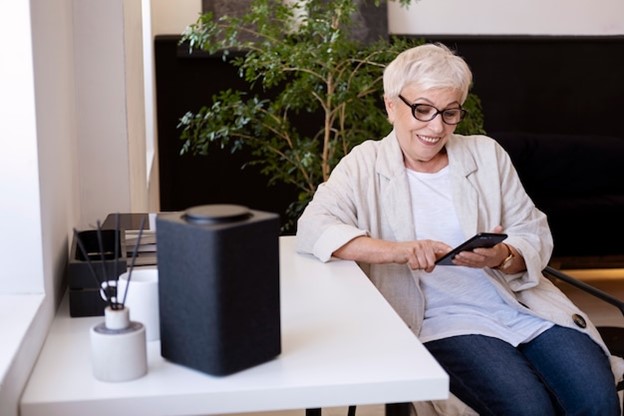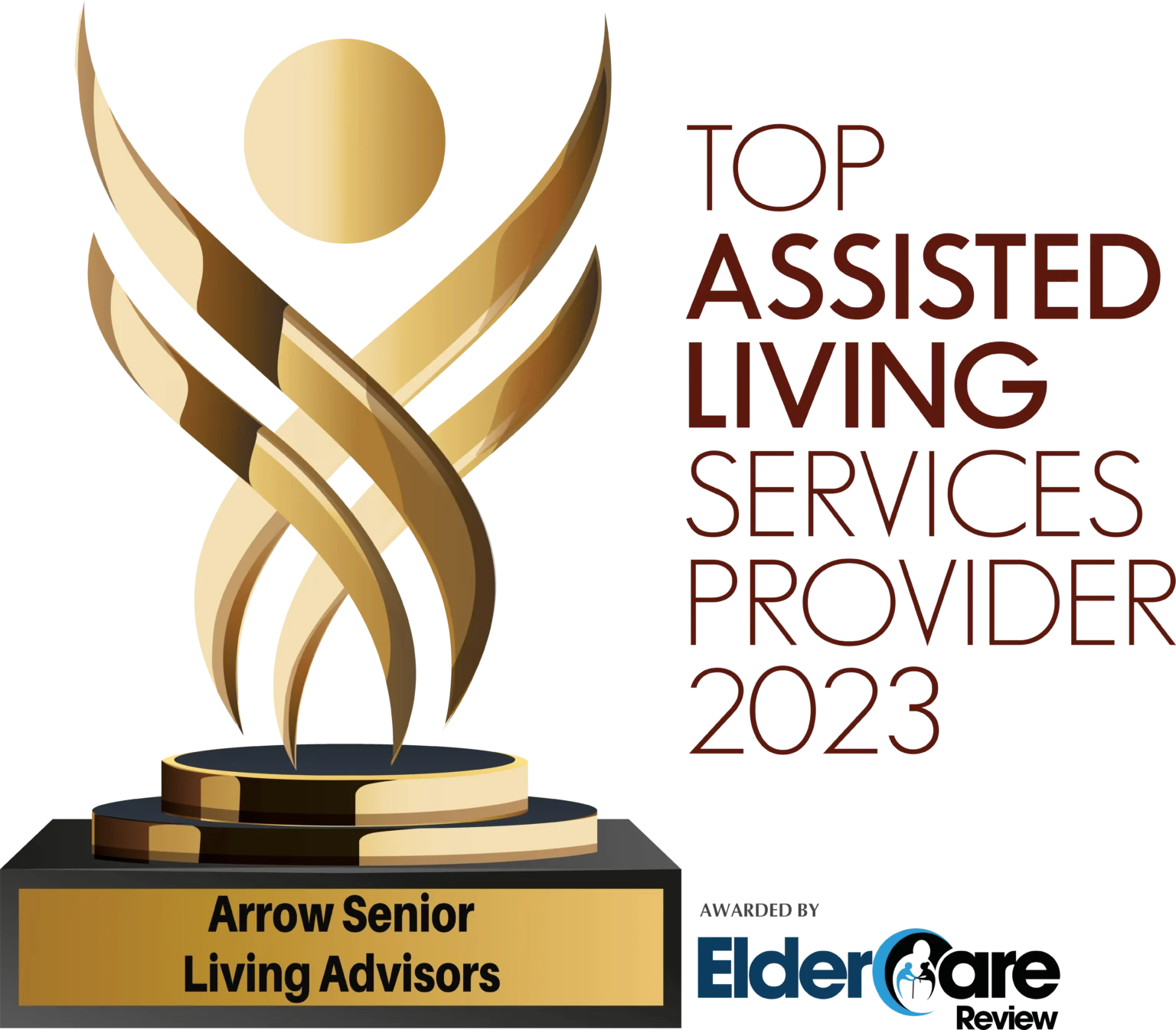The growing integration of senior smart home technology is revolutionizing how seniors experience independence, especially within assisted living and memory care communities. Advanced technologies, such as voice-activated assistants, health monitors, and automated lighting systems, provide seniors with enhanced comfort and safety while maintaining a sense of autonomy. While many seniors still require a supportive living environment, technology can complement the high level of care offered in senior living communities.
This blog explores how these innovations benefit seniors, particularly those living in assisted or memory care communities, and how they improve quality of life.
Voice-Activated Assistants: Enhancing Daily Life in Assisted Living
Voice-activated assistants like Amazon Alexa or Google Home have become crucial tools in senior smart home technology. These devices help seniors manage everyday tasks without the need for constant assistance, fostering a sense of independence within the safety of a professional care environment.
For example, residents can use voice commands to adjust lighting, ask for reminders about medication schedules, or get instant weather updates without having to move from their seats. For those with limited mobility, this technology offers a solution that supports their desire to manage their environment while still having access to caregivers as needed. The presence of these tools in assisted living communities is rapidly improving daily living experiences.
Health Monitors: Improving Health Outcomes in Senior Care Communities
Wearable health monitors have proven to be an essential part of senior smart home technology, especially for seniors living in assisted living or memory care communities. Devices like smartwatches and health trackers enable real-time health monitoring and send important health data to caregivers and healthcare professionals. This technology allows caregivers to respond promptly to any health irregularities, ensuring residents receive timely medical attention.
Health monitors are particularly helpful for residents with chronic conditions such as heart disease or diabetes, as these devices track vital signs like heart rate, blood pressure, and sleep patterns. In memory care, these devices can also assist in tracking wandering or other symptoms common to dementia patients. By supporting continuous monitoring, health technology not only helps prevent medical emergencies but also contributes to better long-term health management for seniors in assisted living.

Automated Lighting: Fall Prevention and Safety
Falls are a significant concern in senior care communities, especially for those with mobility issues. Automated lighting systems are one of the key components of senior smart home technology that help prevent falls by providing consistent and well-timed lighting. Moreover, automated lighting can be set to turn on when residents enter or exit rooms, reducing the risk of tripping in dimly lit areas.
For memory care residents, the safety benefits are even more pronounced. Automated lighting can help guide residents through hallways, preventing disorientation and minimizing the chance of injury. Integrating these systems in senior living communities ensures that residents enjoy a safer, more secure living environment, while also easing the concerns of their families.
Smart Kitchen Appliances: Safer Meal Preparation
Smart kitchen appliances offer another layer of security and independence for seniors in assisted living communities. In communities where seniors have access to small kitchens or shared cooking spaces, smart stoves, ovens, and refrigerators can help ensure safety without compromising the experience of meal preparation. Appliances with automatic shutoff functions reduce the risk of kitchen fires, and some can even be monitored remotely by caregivers.
While these technologies can empower seniors to maintain some level of control in the kitchen, they operate within a carefully managed environment. Assisted living communities that incorporate senior smart home technology into their kitchens offer a safe and enjoyable experience for residents who want to participate in meal preparation while still having immediate support if needed.
Memory Care Benefits of Senior Smart Home Technology
In memory care communities, senior smart home technology offers tailored solutions for residents with cognitive challenges. Automated medication dispensers, wearable GPS trackers, and cognitive engagement devices can significantly improve safety and quality of life for those living with Alzheimer’s or other forms of dementia. For example, medication dispensers with built-in reminders ensure that residents don’t miss important doses, reducing the risk of medical complications.
Wearable devices can track residents’ movements, alerting caregivers to any potential wandering, which is a common issue in memory care communities. These technologies provide families with peace of mind while supporting caregivers in delivering the best care possible. The use of technology in memory care communities also allows residents to engage with cognitive tools that help stimulate memory and reduce the symptoms of isolation, ensuring that technology works alongside professional care.

Smart Locks and Security Systems: A Safer Living Environment
Security is a top priority in senior living communities, particularly those offering assisted living and memory care. Smart locks, doorbell cameras, and motion sensors offer enhanced security features for residents and staff alike. In senior living communities, these technologies help manage visitor access and alert staff to potential security breaches, ensuring that residents are safe from harm.
Smart doorbell cameras allow staff to monitor who enters and exits the space, while motion sensors can detect unusual movements, which is particularly important in memory care units where residents may wander. These security measures offer an additional layer of protection, making the living environment not only safer but also more comfortable for residents and their families.
The Role of Technology in Senior Social Engagement
One often overlooked but highly beneficial aspect of senior smart home technology is its ability to promote social interaction. For seniors in assisted living or memory care, staying connected with loved ones is crucial for emotional well-being. Voice-activated devices that integrate with video calling platforms enable seniors to maintain relationships with family and friends, no matter where they are.
Looking Ahead: The Future of Smart Technology in Assisted Living
The role of senior smart home technology will continue to evolve as the needs of seniors in assisted living and memory care communities change. New advancements in artificial intelligence (AI), robotics, and virtual reality are poised to further improve the independence, safety, and quality of life for seniors in professional care settings. By integrating these technologies into senior living communities, we can enhance the care experience and meet the growing demand for high-quality, personalized senior care.
Discover the Power of Senior Smart Home Technology with Our Expert Guidance
At Next Level Senior Advisors, we understand how important it is to find the right balance of independence and care. Whether you are looking into assisted living, memory care, or independent living communities, we’re here to guide you every step of the way. Our team specializes in providing personalized advice, helping families explore senior smart home technology and other innovative solutions in senior care. Contact us today to find the best fit for your loved one’s needs. We have helped countless families find the right community in Oklahoma City, Tulsa, Wichita, St. Louis, Houston, Lubbock, San Antonio, Albuquerque, Santa Fe, Des Moines, Charlotte, or Allentown.




